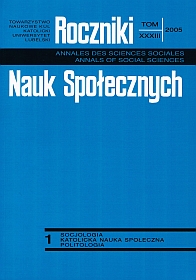Postmodernist Conception of Social Life
Abstract
Postmodernists’ opinions on social life are fragmentary, diverse and ambivalent and they are mainly concerned with three categories: community, nation and state. J. F. Lyotard and R. Rorty treat the origin of community as the result of a temporary social contract, whereas Z. Bauman considers freedom, differentiation and solidarity as the foundation of the political community. All postmodernists call in question ontological foundations of social life and this is why they express their criticism of the categories of nation and national state. Bauman accepts the ideas of cosmopolitism, and M. Foucault suggests the political conception instead of the ethnic-cultural conception of the nature. Postmodernists’ common position is a decided anti-totalitarianism, but they differ in their appraisal of state models; Rorty accepts the liberal model of parliamentary democracy, Lyotard considers it as out of date, and Foucault favors the ideas of anarchism, and that is why he considers any kind of political power connected with state structures to be a form of violence against man. Some postmodernists accept the idea of solidarity, but they call in question its foundations: the ontological one – the existence of the human nature, and the religious one – the idea of love of the neighbor. Rorty bases the postulate of solidarity on the belief that the differences that divide people are less important than their common characteristics. Bauman sees the basis of solidarity in the accidental character of man and in community of all people’s fate.
Copyright (c) 2005 Roczniki Nauk Społecznych

This work is licensed under a Creative Commons Attribution-NonCommercial-NoDerivatives 4.0 International License.


